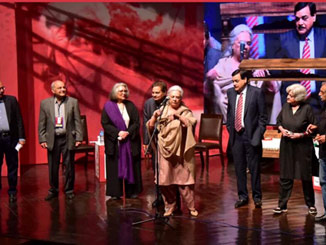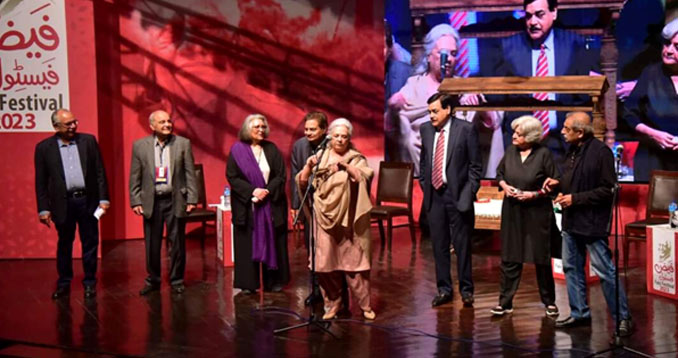

SAPAN NEWS Of the international delegates from USA, Canada, UK, and India who attended the annual Faiz Festival in Lahore this year to commemorate one of Southasia’s most venerated poets Faiz Ahmad Faiz, it was most difficult to obtain visas for the guests from India.
“It’s a really big deal that even eight or nine Indian delegates managed to come. We really need these exchanges,” says Pakistani physician Dr Cyma Firdous in the Bay Area who watched severa festival sessions online.
The Indian delegates included writer and poet Javed ‘Jadu’ Akhtar and theatre director Danish Husain, who upholds the 13th-century storytelling art of dastangoi, both from Mumbai. Poet Dr Arvinder Chamak, historian Munish Singh, and film producer Bobby Sachdeva arrived from Amritsar.
“I always leave a bit of my soul behind in Lahore every time I visit,” Dr Chamak later told Sapan News in Punjabi. He believes peace and harmony are inherited and anything we inherit, we’re bound to pass on and prays for the strength to promote these values.
All the Indian delegates spoke at well-attended sessions, but Akhtar was perhaps the biggest crowd-puller. People waited in long queues for his session ‘Jadunama: Javed Akhter in conversation with Adeel Hashmi’ at the nearly 700-seater Alhamra Hall 1 on Lahore’s Mall Road. The auditorium was suffocatingly full, with many standing in the aisles for the session.
The controversy subsequently generated by Akhtar’s comments at another session, picked up by social-media users and media in Pakistan and India, led to accusations and counter-accusations on either side. But there was much more to the festival than that.
“It’s unfortunate that one comment in that entire session was pulled out, and that too in response to an entirely inappropriate question,” said Dr Firdous, talking to Sapan News.
In the session, Akhtar delved into the history and context of Urdu language, its syncretic nature and its influences. Unlike Latin, Sanskrit, Greek, English or Arabic, where the earliest poetry was laden with religious references, he said, Urdu is the only language that has been ‘secular’ from day one, he noted.
The constant, non-linear nature of change came up at another session, with dastan-goh Danish Husain talking about cultural elements including language that appear or disappear occasionally, as we inherit, learn, unlearn from others over time.
Literary giants Zia Mohyeddin and Amjad Islam Amjad were sorely missed. Both passed away days before they were due to attend the festival.
This was the seventh Faiz Festival in Lahore, a three-day gala of activities including literary sessions, book launches, theatre, music and dance shows, including a kathak performance by schoolgirls.
The city’s syncretic soul finds expression in the heart of Lahore where the call for prayer, azaan, heralds each dawn while church bells chime a welcome from the next street, and Hindus pay homage at temples. And at the Faiz festival people of different classes co-mingle — workers, businesspersons, intellectuals.
Literature lovers and celebrity watchers thronged the Alhamra Arts Council’s red brick buildings, alongside a host of guides and volunteers navigating high level security arrangements. Catering to various taste buds was a food corner with a variety of Asian, Indian and Chinese cuisine.
Hands-on sessions included workshops on theatre and kitchen gardening, besides a range of activities for children – painting, stitching, hand-weaving, story-reading. One popular activity had people writing letters to Faiz.
In one panel, activist Khawar Mumtaz, former chair of the Women’s Commission of Pakistan, highlighted the role of women in leadership. Often it is moments of crisis that allow women a place in politics. Barely 75 years ago, when girls were not allowed to attend school, women like Abadi Bano — mother of Maulana Muhammad Ali Jauhar and Shaukat Ali — raised a voice for the right to education. Discarding purdah, she addressed an open gathering, forcing an acceptance of her leadership.
In another session on ‘Keeping the Living Heritage Alive’, art educator and Faiz’s older daughter Salima Hashmi and former television broadcaster Mahtab Rashdi, in dialogue with Indian delegates Danish Husain and theatre director and writer Atul Tiwari, shared thoughts on values, manners and intolerance.
Faiz symbolises a certain way of thinking, just as Mahatma Gandhi does, commented Tiwari. He talked about the ‘Dandi Kutir’ museum in Gandhinagar, Gujarat, that he founded dedicated to Mahatma Gandhi “who didn’t believe in collecting things”.
However, there is no Faiz Museum in Pakistan. If the Pakistan government makes a Faiz Museum, his family will donate all of Faiz’s belongings to it, said Salima Hashmi, just as the Allama Iqbal Museum showcases the belongings of Pakistan’s national poet, like books, furniture, pen and desk. She quoted her mother Alys Faiz as saying that Faiz belongs to the people.
“Heritage, intangible or tangible, is a part of a whole, it is all inclusive. We have been in this region for thousands of years. All this is our heritage and we can make it live, or we can let it die,” added Hashmi.
She also participated in a performance of satirical skits from the 1970s penned by her spouse Shoaib Hashmi, creator of the legendary Such Gup team. Members of the original team joined her in this trip down memory lane – comedian Irfan Khoosat, actors Salman Shahid and Shehryar Zaidi, educationist Navid Shahzad, retired academic Abbas Shafi, artist Maryam Hasan, and composer Arshad Mahmud.
Faiz’s birthday in mid-February coincides with the spring festival Basant across Punjab. In Pakistan, in 2007 the Punjab government banned kite-flying on account of the loss of lives caused by a combination of modern-day kite strings, faster traffic and denser population.
But as often happens, the negative has overshadowed the positive.
The Javed Akhtar controversy arose from his response to a question at his session about what message of peace he would take back with him.
Stating that he would not mince words, Akhtar remarked that those responsible for the 2008 Mumbai terror attacks are still roaming free in Pakistan. He added that while India has hosted Pakistani musicians like Mehdi Hassan and Nusrat Fateh Ali Khan, Pakistan never hosted legends like Lata Mangeshkar.
He went on to emphasise the need for dialogue and cultural exchanges and for people to get to know and understand each other. But the damage had been done.
Akhtar’s words were not entirely accurate either. Pakistan has hosted many Indian artists — Naseeruddin Shah, Zeenat Aman, Om Puri, Urmila Matondkar, Vinod Khanna, and Mahesh Bhatt to name a few.
But it was Akhtar’s few brief comments about the Mumbai attacks that spread rapidly on social media, picked up by mainstream media in Pakistan and India. Back home, Akhtar had to defend his visit to Pakistan and his hosts. Faiz Festival organisers have refused to comment on the controversy.
The verbal mudslinging shows once again how India-Pakistan relations and the tendency towards finger-pointing tend to overshadow any good that may happen.
“dast-e-afshan chalo, mast-o-raqsan chalo,
khaak bar sar chalo, khoon ba-daman chalo
raah takta hai sab shehar-e-jaana chalo”
“Walk waving hands with pride, walk singing and dancing,
March with dust filling our hair, walk with our blood-stained clothes
The city of my beloved watches, let’s walk”
As Dr Arvinder Chamak observed in his pre-festival video message in Punjabi, “Faiz’s philosophy has been a beacon for not only two Punjabs or for the two countries but for the entire universe, and will continue to be a light for the future.”
Sara Arshad is a teacher, poet, and writer in Lahore. Beena Sarwar is a Boston-based journalist and the founder editor of Sapan News Network.

Leave a Reply